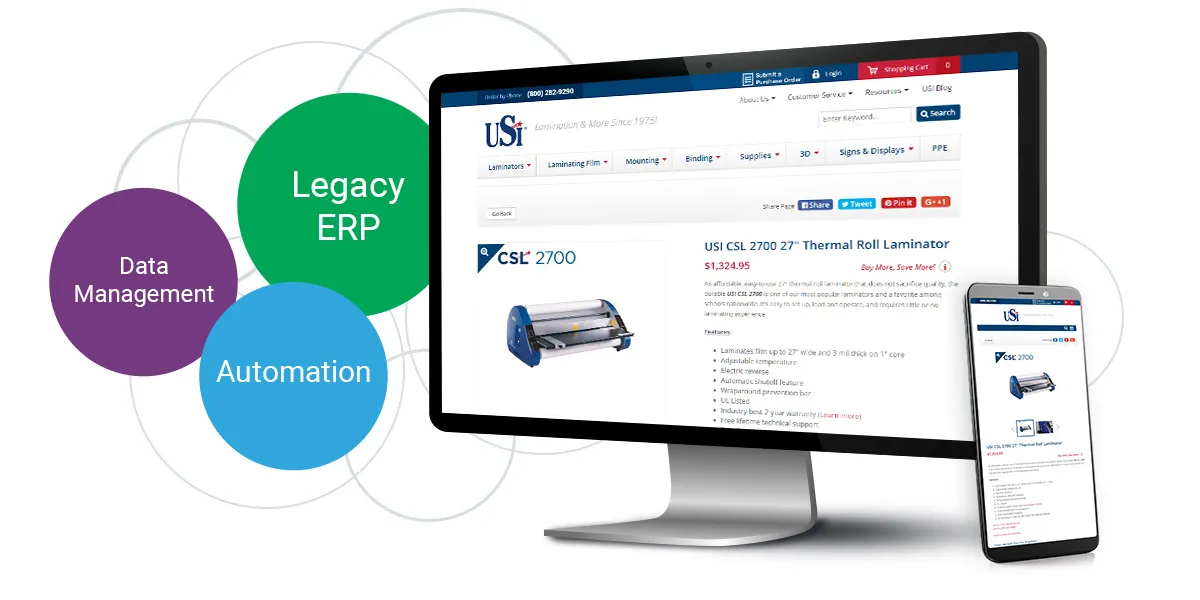
DIGITAL TRANSFORMATION
Build the future of intelligent enterprise.
Planning your technical architecture to match your company standards is only the first step of digital transformation. Do business with your customers where they are, online. Disruption-proof. Scalable. Integrated. Global.
Reach your goals
Corporate leadership knows they need to stay competitive by offering a digital landscape to customers, both B2B and B2C. The why has already been determined, you need a partner to show you the how.
Organizations that are upgrading their online experience will realize greater growth. Planning for this kind of directional pivot requires incremental changes and a skillful systems process.
Acro Commerce will guide you through the steps to building a roadmap and a detailed plan for your transformation.
A plan your C-suite can get behind.
Every enterprise organization believes its business is too complex, regulated, customized or people-oriented to bring it online.
Learn how to:
- Design new frameworks and connect old tech with new ones.
- Offer B2B and B2C experiences that are technology-driven and people-facilitated.
- Layout a roadmap that others can execute, allowing leadership to monitor.
- Calculate the risk and return of a phased approach.

Modern solutions for traditional operations
Your business operations are a well-oiled, proven machine. There are systems that you depend on day in and day out. Developing a digital transformation strategy for your business doesn’t mean getting rid of those tools. It means creating ways for those legacy systems to come with you through digital transformation.
Warehousing, sales, marketing, IT, product development, finance. Each of those departments has its own essential operational platform. Through integrations like application programming interface (API) technology, you can bring all your teams’ platforms together. Sharing data between those traditional silos can move operations from sloth-like to lightning fast.
Once you have everyone sharing information and automating processes, your teams are freed up to develop ways to scale your online business and connect with new markets. Sell through industry-related marketplaces, create omnichannel product distribution, or even break into other global markets. Your growth possibilities are endless through new digital properties.
Organization-wide alignment makes projects successful
Increase buy-in with stakeholder interviews
Getting everyone on board for change and making sure the company’s goals are aligned can be difficult.
Start the conversation on digital projects early with your key stakeholders. These conversations will get your entire team on board and ensure project success.
Let IT lead the way with legacy evolution.
Fully integrated information architecture improves data flow and reduces bottlenecks due to departmental silos.
Improving your tech stack will give you:
- A secure and flexible platform that eliminates manual data entry.
- Integration ability for legacy and ERP systems into current platforms.
- Streamlined and completely automated stock, fulfillment, logistics and sales management between all revenue streams.
Finally, let's consider the marketing team.
Hone your marketing tactics through integrated platforms and refined customer data. Digital transformation makes your team:
- Empowered to market your product effectively.
- Free to show your brand's personality.
- Equipped with the platform and tools you needed to get it done.
Platforms & related services
USI Laminate case study
A solution to support and integrate legacy systems allowed more automation and control over data management and provided a responsive, real-time catalogue experience for their customers.
See how Acro Commerce got it done for a market-leading B2B organization.
Successful B2B digital transformation
Digital transformation in B2B requires a new mindset. Creating a company-wide desire for change can be difficult for established, mature companies. Involving company stakeholders in the strategic process makes creating that new hive mind easier.
Digital transformation is a process; it needs to be road mapped and phased out as per business needs. Getting your entire B2B organization online can’t be done in one major project; it must be transitional.
Developing your digital manifesto requires the coordination of all departments. Sales, marketing, IT, manufacturing, operations, finance, supply chain and customer service all have a part to play in any digital strategy. Excluding one of these teams in the construction of the system or technology will result in project complications or outright failure.
Rather than committing two million dollars to a project and waiting a year for it to get done, we break it down using Agile development principles and a mindset of continuous innovation. This process ensures that B2B companies have the opportunity to complete essential tasks like stakeholder interviews, internal audits and competitive analysis while keeping the project moving forward efficiently and effectively.
Let's talk about your project
No matter what stage you are in, we would love to talk to you about your project. No pressure, no obligation, just straight talk and helpful insight.
